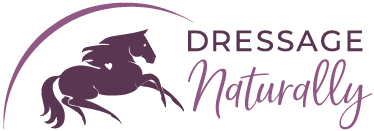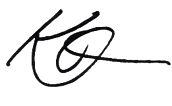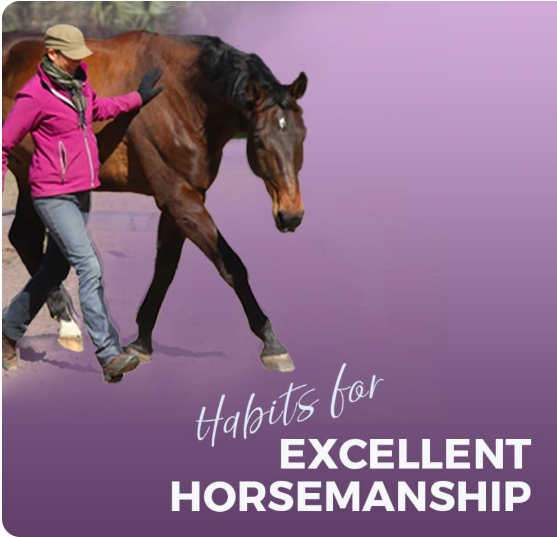Settle in for my thoughts on how to know your horse is happy and how to increase his levels of happiness! (45 min video. Written summary below)
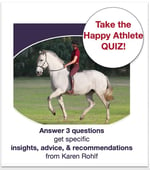
Take The Happy Athlete Quiz
Ever wonder how you and your horse are doing and how you could improve? Answer just three questions, and based on your answers and I will give you some specific insights, advice, and recommendations.
Summary of Video
The Object of Dressage is the development of the horse into a happy athlete...
~ F.E.I. and USEF Dressage Rule Book
Determining Happiness is hard enough with other humans (and even ourselves), so with our horses and animals the first thing is to admit that I am always taking my best guess at how they are actually feeling.
It’s not only about ear position, or body posture or heart rate. Horses can have their ears forward when they are terrified. They can seem OK and quiet when they’re frozen or in learned helplessness. Some horses can look miserable when they are concentrating, at rest or during physical activity. We KNOW this because this happens with ourselves too! Resting B-face and the faces of human athletes during competition can look much more unhappy than what the person would report actually feeling in the moment. I know my heart rate goes up when I am about to do something exciting or invigorating that I am really HAPPY to do.
Happiness is a FEELING… It’s something we need to Feel. The tricky part is to really feel the animal and not project what our feelings on to them.
The way I FEEL will affect my interpretation about how THEY FEEL. How I feel will also affect how they will actually feel. So it is up to me to be as happy as I can be when with my horse! If I want to make my horses happy… I need to make myself happy first.
Happiness is at the base of my Happy Athlete Training Scale.
Does happiness matter, or is simply not unhappy enough?
It matters - to ME. It’s the basic premise and the context within which I do everything… It’s the first goal.
However, not Unhappy is a great place to start. Remove the things that are actively making him unhappy.
Consider the needs of the horse…
Horses basic needs To feel safe, have forage-based diet, freedom to move, and social Interaction.
Consider the needs of the individual…
Some are more social, some are more curious, some like scratches, some don’t, some like adventures, some don’t, etc. Find out what your horse's preferences are so you can know how to make him happier.
There is a range:
Actively unhappy (suffering) - Neutral (not unhappy) - actively happy (joyous).
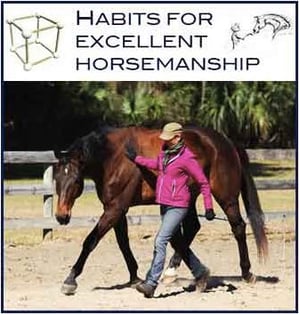 2 areas of their life to look at:
2 areas of their life to look at:
When you are NOT around and when you are around them…. Be aware of where they land on the scale of suffering to joyous in each of those those situations.
The worst case is if they were kept in actively painful or fear-inducing conditions, and when their human interacted with them it was also painful and fear-inducing… That’s a nightmare.
The best is the Disney movie: Ample forage and freedom, other horses to play with, a varied, yet safe environment… and when they see you they love you so much they come running to you and willingly and freely offer you everything you ask for because you are so amazing and fun to be with.
Reality is somewhere on that scale… At the very least: Keep it neutral and they will be OK. Do your best to create a net positive to keep them even happier. If one area is less than ideal, make up for it in others.
According to THEM
When assessing the quality of the life you give them remember, it’s according to them… You may THINK you are giving them things that ‘should’ make them happy. Horses don’t care about how expensive or fancy (or not) the barn that you built for them is. Make sure what you do is making them happy, not just you.
Book: My Life With Karen
If your horse wrote a book called: My Life With (your name)... What kind of book would it be? Tragedy? Comedy? Story of personal empowerment? Adventure? Horror?
What was your first instinct for your answer to that question. Be honest with yourself. From there you can start to improve.
What is happiness anyway?
Happiness = harmony. It's when your mind is at peace
Happiness is when what you think, what you say, and what you do are in harmony. ~ Mahatma Gandhi
Horses want to feel safe and understand and be able to predict their environment. The clearer we are, the more we make sense, inside and out, the happier our horses can be.
Happiness is:
- Contentment: ‘I’m happy with that’
- Willing: ‘I’m happy to do that’
How do we know if they are happy?
- They don’t seem unhappy
- They want to participate
- They are curious
- They know to look for solutions (they feel some control over their experience)
- They FEEL happy to be around
Freedom & Choice
How will we know how willing they are to participate unless we give them the opportunity - the freedom, to choose it (or not)? Balance having enough control to keep them (and you) safe in this crazy human world with enough freedom for them to have choices.
Help them be OK with their boundaries (contentment) and give them a lot of opportunity for choice within them.
When you give them choice it’s easier to see how ‘happy’ they are to do things.
Examples: Horses coming to you versus running away when you go to catch them, horses who practically put the bridle on themselves versus lift their heads up to avoid, horses who self-park at the mounting block versus needing 2 people to hold them while you get on.
On days I don't ride him, my horse Ovation will often show up in the barn and put himself in the grooming stall seemingly wanting it to be his turn to go for a ride. My horse Solana loves being bathed and will hijack other horse’s showers by coming in the wash stall with them.
You can use this as really valuable information. You can use what he likes as rewards and investments in the relationship bank account.
You can also start to learn what he looks like when that changes. You can see the difference between your horse actively wanting (being happy) to do something and not wanting to do something.
Know your horse…. What does each individual horse move towards and away from when given the chance?
Assess yourself - how much does your method rely on obligingness, control, and submission? Have you trained your horse to NOT tell you what he is willing and eager to do and what he doesn’t like or want?
Do you give your horses opportunities to move into the joyous end of the spectrum? So they can feel proud… Can you set things up so they get a chance to offer stuff? Or do you always use controlling methods?
Controlling methods seem like they help you eliminate mistakes, but they also eliminate the chance for your horse to offer something more amazing.
Successful training
The measure of successful training is the horse understands and has an opportunity to offer what is being asked of him!
Focus on being clear, and being motivating.
This gives horses some feeling of control over their experience. They participate… in a way that is different than just submission and control.
The Object Of Dressage in its entirety gives you lots of clues about what a happy athlete is:
The Object Of Dressage is the development of the horse into a happy athlete through harmonious education resulting in a horse that is calm, loose, supple and flexible, but also confident, attentive, and keen, thus achieving perfect understanding.
It doesn't say: Obliging and tolerant. It is about clarity, understanding, and willingness to participate. It is about mental, emotional, and physical openness.
Questions to ask yourself
Book: My Life With Karen
If you think the book your horse would write wouldn't be so positive - what do you think would need to change to make it better? What is one small way you could improve his happiness when you are with your horse and when you are not? What could you change to have more of the chapters become happier?
Contemplate:
- Are his basic needs as a horse met: Does he feel safe? (lack of fear) Is he comfortable? Is he bored, anxious, confused, or in pain? Is he lonely? Does he need more time alone?
- Assess his needs and preferences as an individual: What would make him more actively happy?
- How can you safely give him more freedom & choice?
- How can you nurture curiosity? Or at least create opportunities to allow it!
- How can you motivate him so he wants to participate with you?
- How can you help your horse feel more successful, proud and appreciated for his efforts?
You got this.
Don't worry - If you are even thinking about how to make your horse happy, your horse is likely happier than those who are with people who haven't thought about their horse's happiness.
If your heart &mind have the intention of your horse being happy…. and you are in the moment… your best guess about what your horse needs will be a great guess.
Next time you think about or are with your horse... Take a deep breath and ask him: How can I help you be happier?
Be here. Be happy. Be your best
